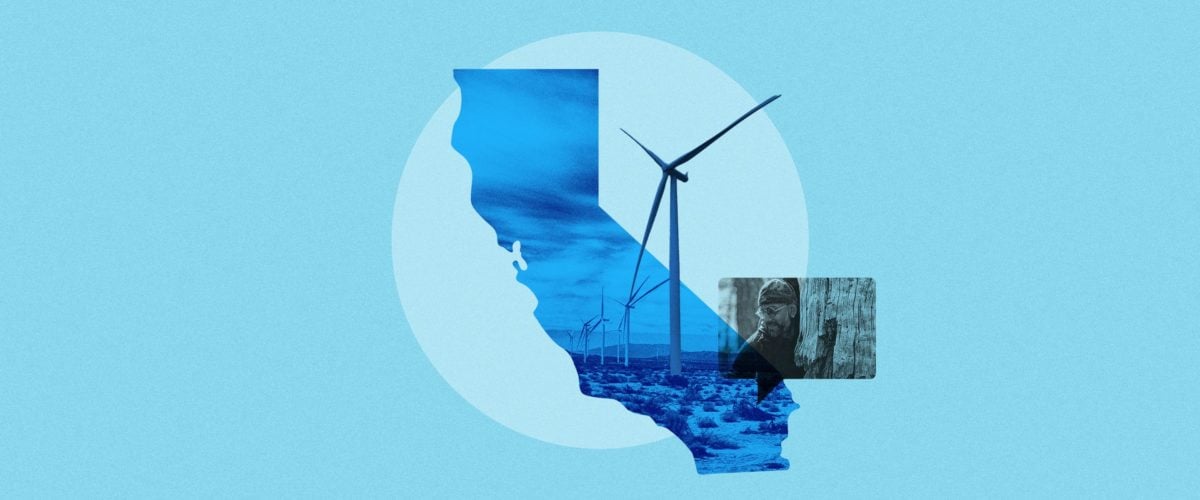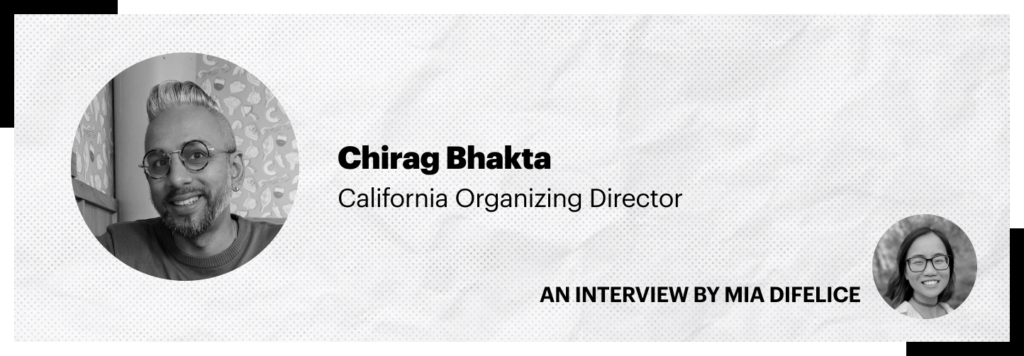Our New California Organizing Director on Fighting For the Future
Published Nov 2, 2022

Food & Water Watch’s new California Organizing Director Chirag Bhakta talks about what’s ahead for the state and how we can build a better future, together.
This summer, Food & Water Watch welcomed a new California Organizing Director, Chirag Bhakta. Digital copywriter Mia DiFelice sat down with Chirag to talk about organizing, water issues, and what lies ahead for California. The interview has been edited for clarity and length.

Welcome to Food & Water Watch, Chirag. I want to start by asking about your background. How did you get into organizing and environmental issues?
Before Food & Water Watch, I was the director of an organizing center here in the Mission District of San Francisco. We focused on developing and training local leaders to become community organizers. Helping folks who are usually counted as numbers, or relegated to outreach work, to lead their own campaigns, so they can organize for the future of their own communities.
Before that, I worked at an organization focused on affordable housing and anti-gentrification, through a similar lens of How do we gain community control of our futures? How do we fight for a future that’s still open ended?
For me, as someone who grew up here in San Francisco, an open-ended future is one that allows poor, marginalized, and mostly immigrant communities to have a secure place in the city. One that isn’t precarious to political power or how the city decides affordability. We need to solidify that for us, because otherwise, if the market dictates the future, that future doesn’t include us.
And that, I think, is the same for climate issues, for food and water issues. But on a scale that’s a lot larger in terms of basic livability. The issues I’m now working on are so fundamental to how we wish to exist on the planet, or how we expect to exist with the planet.
What drew you to Food & Water Watch, especially from an organizer’s perspective?
Food & Water Watch centers the hard decisions we need to make as a society. It doesn’t shy away from saying “We need to ban fossil fuels,” or “We need to ban fracking.”
Even now as the climate issue becomes more mainstream and centrist, Food & Water Watch has stayed firmly with its values, on the correct side of the issues.
And it also focuses on how we collectively need to make those decisions. It’s not pushing for a closed-door committee to solve the climate crisis. Food & Water Watch is working to democratize how we’re gonna exist on this planet.
With other organizations in this space, the how-to is different. The level of trade-off when you’re embedded with the powers-that-be is different. If we’re gonna do this work, why would we capitulate? And why would we let our capitulation define the solutions for everybody else?
If we want a future that looks any different than it does now in terms of climate and power, we have to fight for it ourselves, together.
When it comes to California, what are you most excited about and what are you most concerned about?
California is a defining policy entity on climate. That gets me excited because there’s a lot of potential here for California to be a real leader. A lot of states, even countries, can take stances on climate change, but when California takes a stance, the markets move. We can actually develop a future that’s possible for the rest of the planet.
We have all of the resources to do so. What we need is the political will. And we have an opportunity to build that political will in California. Some of that is going to come up in future work we’re planning, focused on the water crisis and drought in the state.
The water issues in California affect everyone. We all know about the drought, but less so about the why. It’s related to climate change, but a major impact comes from resource exploitation. I think that’s what’s been missing in the narrative around water in California. I’m excited to bring that into the picture.
What has me concerned: the work’s gonna be difficult and the stakes will be big. People’s everyday issues are gonna get bigger and bigger. Rent, food, gas, jobs — people are feeling the strain of our failed economics deeply. That comes before the next rain, the next flood, the next drought, the next wildfire season.
Oftentimes, we speak on these issues on a grand scale, so a lot of people won’t see them as dinner-plate issues. However, for most, these are dinner-plate issues. That’s just not the narrative that’s out there. But we have the opportunity to connect Food & Water Watch’s issues to folks’ dinner-plate issues.
What advice would you give to someone who wants to do more in this movement?
Get involved in our volunteer network! We’re gonna be doing a lot of fundamental organizing and exciting movement work in California, especially in 2023. We’re gonna have so many opportunities and actions for folks to be involved in, as climate leaders and champions, in California.
The advice I have — Don’t think you can’t. If we can shift that mindset, from thinking you can’t to thinking you can, that will fundamentally shift the victories that are possible for us. Our belief in ourselves and each other is a powerful motivator.
Connect with people in your community, find out what’s happening. Don’t be afraid to make your voice heard, whether it’s with local government, state government, or at the national level. The future is yours and you should have a say in defining that. The planet is ours and we need to have a say in defining that.
Learn more about joining our work, in California and beyond!
Enjoyed this article?
Sign up for updates.
TO TOP


